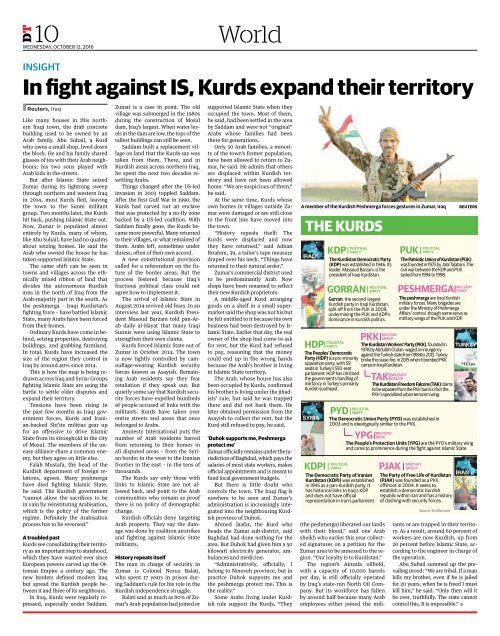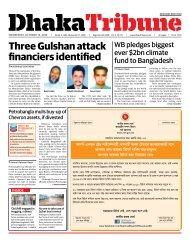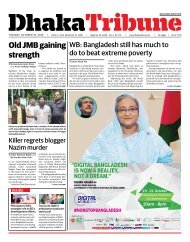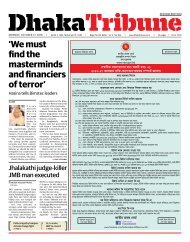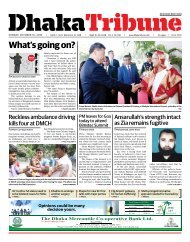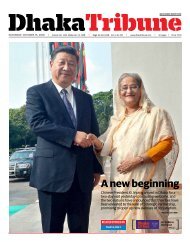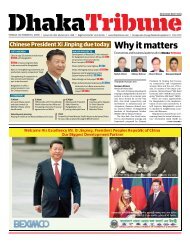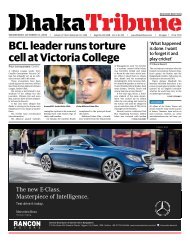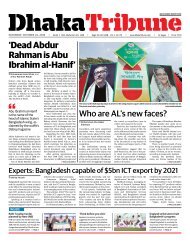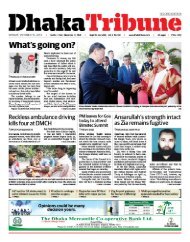ePaper_2nd Edition_October 12, 2016
You also want an ePaper? Increase the reach of your titles
YUMPU automatically turns print PDFs into web optimized ePapers that Google loves.
10<br />
WEDNESDAY, OCTOBER <strong>12</strong>, <strong>2016</strong><br />
DT<br />
World<br />
INSIGHT<br />
In fight against IS, Kurds expand their territory<br />
• Reuters, Iraq<br />
Like many houses in this northern<br />
Iraqi town, the drab concrete<br />
building used to be owned by an<br />
Arab family. Abu Suhail, a Kurd<br />
who owns a small shop, lived down<br />
the block. He and his family shared<br />
glasses of tea with their Arab neighbours;<br />
his two sons played with<br />
Arab kids in the streets.<br />
But after Islamic State seized<br />
Zumar during its lightning sweep<br />
through northern and western Iraq<br />
in 2014, most Kurds fled, leaving<br />
the town to the Sunni militant<br />
group. Two months later, the Kurds<br />
hit back, pushing Islamic State out.<br />
Now, Zumar is populated almost<br />
entirely by Kurds, many of whom,<br />
like Abu Suhail, have had no qualms<br />
about seizing homes. He said the<br />
Arab who owned the house he has<br />
taken supported Islamic State.<br />
The same shift can be seen in<br />
towns and villages across the ethnically<br />
mixed ribbon of land that<br />
divides the autonomous Kurdish<br />
area in the north of Iraq from the<br />
Arab-majority part in the south. As<br />
the peshmerga – Iraqi Kurdistan’s<br />
fighting force – have battled Islamic<br />
State, many Arabs have been forced<br />
from their homes.<br />
Ordinary Kurds have come in behind,<br />
seizing properties, destroying<br />
buildings, and grabbing farmland.<br />
In total, Kurds have increased the<br />
size of the region they control in<br />
Iraq by around 40% since 2014.<br />
This is how the map is being redrawn<br />
across Iraq and Syria: Groups<br />
fighting Islamic State are using the<br />
battle to settle older disputes and<br />
expand their territory.<br />
Tensions have been rising in<br />
the past few months as Iraqi government<br />
forces, Kurds and Iranian-backed<br />
Shi’ite militias gear up<br />
for an offensive to drive Islamic<br />
State from its stronghold in the city<br />
of Mosul. The members of the uneasy<br />
alliance share a common enemy,<br />
but they agree on little else.<br />
Falah Mustafa, the head of the<br />
Kurdish department of foreign relations,<br />
agrees. Many peshmerga<br />
have died fighting Islamic State,<br />
he said. The Kurdish government<br />
“cannot allow the sacrifices to be<br />
in vain by reinstituting Arabisation,<br />
which is the policy of the former<br />
regime. Definitely the Arabisation<br />
process has to be reversed.”<br />
A troubled past<br />
Kurds see consolidating their territory<br />
as an important step to statehood,<br />
which they have wanted ever since<br />
European powers carved up the Ottoman<br />
Empire a century ago. The<br />
new borders defined modern Iraq<br />
but spread the Kurdish people between<br />
it and three of its neighbours.<br />
In Iraq, Kurds were regularly repressed,<br />
especially under Saddam.<br />
Zumar is a case in point. The old<br />
village was submerged in the 1980s<br />
during the construction of Mosul<br />
dam, Iraq’s largest. When water levels<br />
in the dam are low, the tops of the<br />
tallest buildings can still be seen.<br />
Saddam built a replacement village<br />
on land that the Kurds say was<br />
taken from them. There, and in<br />
Kurdish areas across northern Iraq,<br />
he spent the next two decades resettling<br />
Arabs.<br />
Things changed after the US-led<br />
invasion in 2003 toppled Saddam.<br />
After the first Gulf War in 1990, the<br />
Kurds had carved out an enclave<br />
that was protected by a no-fly zone<br />
backed by a US-led coalition. With<br />
Saddam finally gone, the Kurds became<br />
more powerful. Many returned<br />
to their villages, or what remained of<br />
them. Arabs left, sometimes under<br />
duress, often of their own accord.<br />
A new constitutional provision<br />
called for a referendum on the future<br />
of the border areas. But the<br />
process festered because Iraq’s<br />
fractious political class could not<br />
agree how to implement it.<br />
The arrival of Islamic State in<br />
August 2014 revived old fears. In an<br />
interview last year, Kurdish President<br />
Masoud Barzani told pan-Arab<br />
daily al-Hayat that many Iraqi<br />
Sunnis were using Islamic State to<br />
strengthen their own claims.<br />
Kurds forced Islamic State out of<br />
Zumar in <strong>October</strong> 2014. The town<br />
is now tightly controlled by camouflage-wearing<br />
Kurdish security<br />
forces known as Asayish. Remaining<br />
Arab residents say they fear<br />
retaliation if they speak out. But<br />
quietly some say that Kurdish security<br />
forces have expelled hundreds<br />
of people accused of links with the<br />
militants. Kurds have taken over<br />
entire streets and areas that once<br />
belonged to Arabs.<br />
Amnesty International puts the<br />
number of Arab residents barred<br />
from returning to their homes in<br />
all disputed areas – from the Syrian<br />
border in the west to the Iranian<br />
frontier in the east – in the tens of<br />
thousands.<br />
The Kurds say only those with<br />
links to Islamic State are not allowed<br />
back, and point to the Arab<br />
communities who remain as proof<br />
there is no policy of demographic<br />
change.<br />
Kurdish officials deny targeting<br />
Arab property. They say the damage<br />
was done by coalition airstrikes<br />
and fighting against Islamic State<br />
militants.<br />
History repeats itself<br />
The man in charge of security in<br />
Zumar is Colonel Noruz Balati,<br />
who spent 17 years in prison during<br />
Saddam’s rule for his role in the<br />
Kurdish independence struggle.<br />
Balati said as much as 80% of Zumar’s<br />
Arab population had joined or<br />
supported Islamic State when they<br />
occupied the town. Most of them,<br />
he said, had been settled in the area<br />
by Saddam and were not “original”<br />
Arabs whose families had been<br />
there for generations.<br />
Only 50 Arab families, a minority<br />
of the town’s former population,<br />
have been allowed to return to Zumar,<br />
he said. He admits that others<br />
are displaced within Kurdish territory<br />
and have not been allowed<br />
home. “We are suspicious of them,”<br />
he said.<br />
At the same time, Kurds whose<br />
own homes in villages outside Zumar<br />
were damaged or are still close<br />
to the front line have moved into<br />
the town.<br />
“History repeats itself: The<br />
Kurds were displaced and now<br />
they have returned,” said Adnan<br />
Ibrahim, 39, a tailor’s tape measure<br />
draped over his neck. “Things have<br />
returned to their natural order.”<br />
Zumar’s commercial district used<br />
to be predominantly Arab. Now<br />
shops have been renamed to reflect<br />
their new Kurdish proprietors.<br />
A middle-aged Kurd arranging<br />
goods on a shelf in a small supermarket<br />
said the shop was not his but<br />
he felt entitled to it because his own<br />
business had been destroyed by Islamic<br />
State. Earlier that day, the real<br />
owner of the shop had come to ask<br />
for rent, but the Kurd had refused<br />
to pay, reasoning that the money<br />
could end up in the wrong hands<br />
because the Arab’s brother is living<br />
in Islamic State territory.<br />
The Arab, whose house has also<br />
been occupied by Kurds, confirmed<br />
his brother is living under the jihadists’<br />
rule, but said he was trapped<br />
there and did not back them. He<br />
later obtained permission from the<br />
Asayish to collect the rent, but the<br />
Kurd still refused to pay, he said.<br />
‘Duhok supports me, Peshmerga<br />
protect me’<br />
Zumar officially remains under the jurisdiction<br />
of Baghdad, which pays the<br />
salaries of most state workers, makes<br />
official appointments and is meant to<br />
fund local government budgets.<br />
But there is little doubt who<br />
controls the town. The Iraqi flag is<br />
nowhere to be seen and Zumar’s<br />
administration is increasingly integrated<br />
into the neighbouring Kurdish<br />
province of Duhok.<br />
Ahmed Jaafar, the Kurd who<br />
heads the Zumar sub-district, said<br />
Baghdad had done nothing for the<br />
area. But Duhok had given him a 50<br />
kilowatt electricity generator, ambulances<br />
and medicine.<br />
“Administratively, officially, I<br />
belong to Nineveh province, but in<br />
practice Duhok supports me and<br />
the peshmerga protect me. This is<br />
the reality.”<br />
Some Arabs living under Kurdish<br />
rule support the Kurds. “They<br />
A member of the Kurdish Peshmerga forces gestures in Zumar, Iraq<br />
THE KURDS<br />
HDP<br />
The Kurdistan Democratic Party<br />
(KDP) was established in 1946. Its<br />
leader. Massoud Barzani. is the<br />
president of Iraqi Kurdistan.<br />
Gorran, the second-largest<br />
Kurdish party in Iraqi Kurdistan,<br />
split off from the PUK in 2009,<br />
undermining the PUK and KDP's<br />
dominance in Kurdish politics.<br />
The Peoples' Democratic<br />
Party (HDP) is a pro-minority<br />
opposition party, wrth 59<br />
seats in Turkey's 550-seat<br />
parliament. HOP has criticised<br />
the government's handling of<br />
milrtancy in Turkey's primarily<br />
Kurdish southeast.<br />
KDPI<br />
KDP<br />
GORRAN<br />
POLITICAL<br />
PARTY<br />
PYD<br />
The Patriotic Union of Kurdistan (PUK)<br />
was founded in 1975 by Jalal Talabani. The<br />
civil war between the KDP and PUK<br />
tasted from 1994 to 1998.<br />
The peshmerga are Iraqi Kurdish<br />
military forces. Many brigades are<br />
under the Ministry of Peshmerga<br />
Affairs' control, though some serve as<br />
milrtary wings of the PUK and KDP.<br />
The Kurdistan Workers' Party (PKK), founded in<br />
1978 by Abdullah Ocalan. waged an insurgency<br />
against the Turkish state from 1984to 2013. Turkey<br />
broke the cease-fire. in 2015 when it bombed PKK<br />
camps in Iraqi Kurdistan.<br />
The Kurdistan Freedom Falcons (TAK) claims<br />
to be separate from the PKl< but is in fact the<br />
PKI


